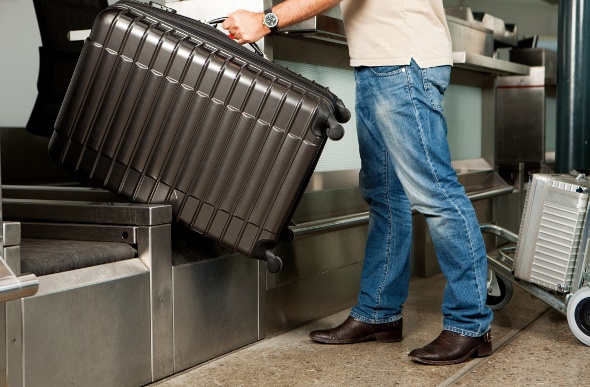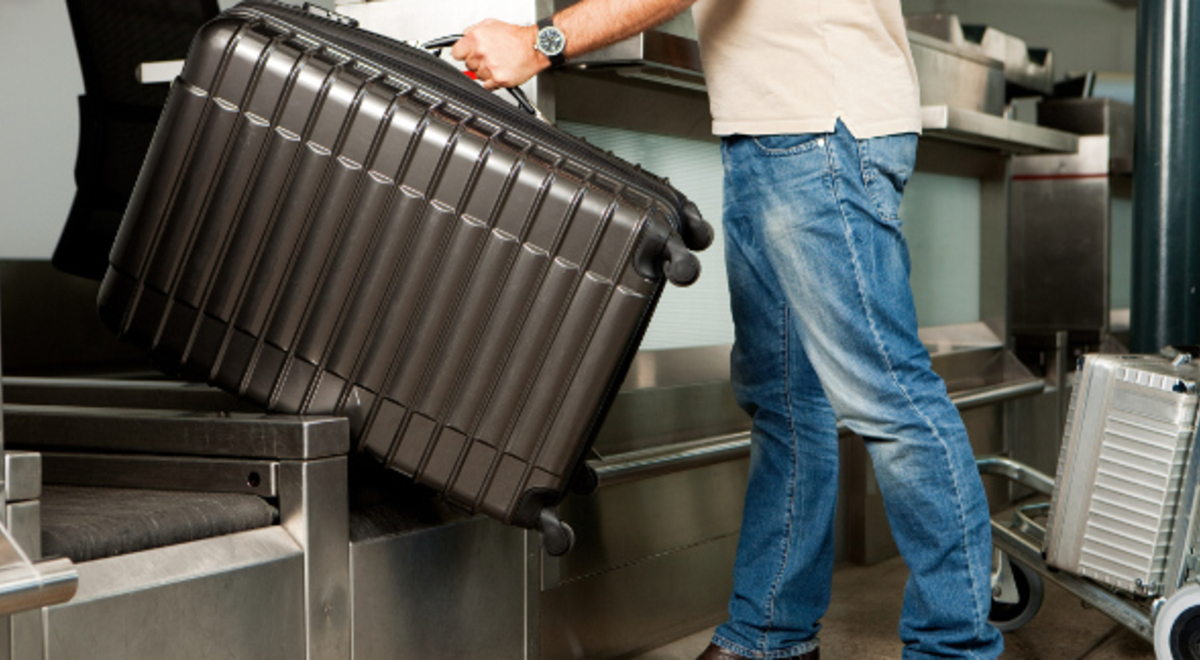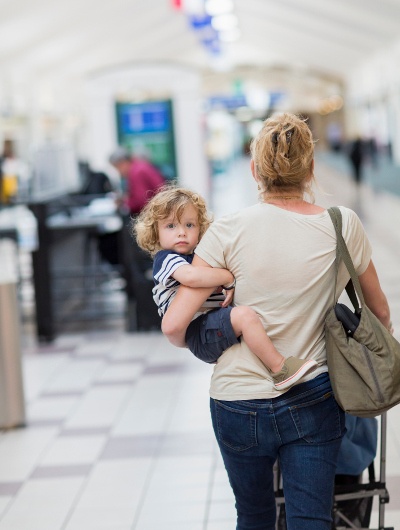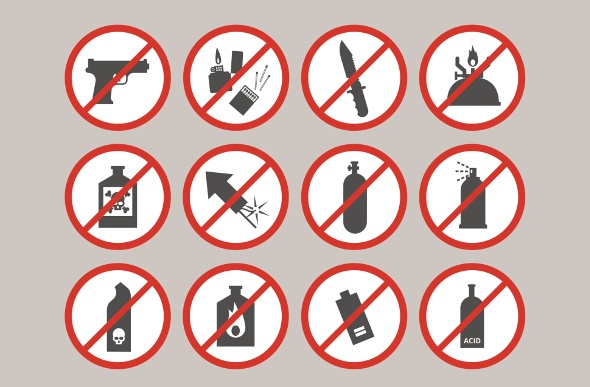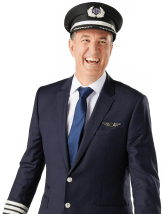It's important to know exactly how much luggage you're allowed on your flights – carry-on and cabin baggage. This helps prevent you from incurring unwanted fees and headaches.
The following guide on airport baggage includes general information only. For more detailed information please check with your airline directly or refer to our airline guides.
Carry-On
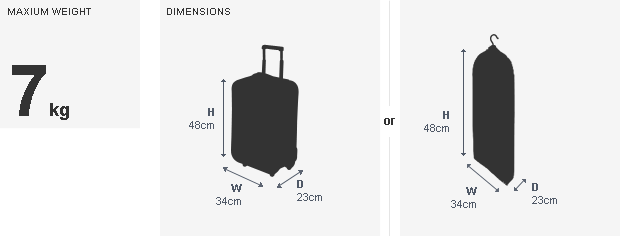
As a general rule, passengers are allowed to take one bag and one personal item with them onto their flight. As such, there are certain size and weight restrictions to ensure each passenger's belongings can fit in the cabin.
Personal items usually include a handbag, briefcase or laptop bag that can fit easily underneath the cabin seat. In addition to a personal item, passengers may be able to bring on an additional bag or suit pack that can fit easily and be lifted by the passenger, into the overhead locker.
Carry-on weight for bags may vary between classes and airlines. As a general guide, Economy Class passengers are allowed to carry one bag at five-seven kilograms per person, while Business and First Class passengers are often privy to a more generous baggage allowance or extra pieces.
 Take an extra set of clothing in your carry-on bag in case of the unforeseen mishap.
Take an extra set of clothing in your carry-on bag in case of the unforeseen mishap.
Checked Baggage
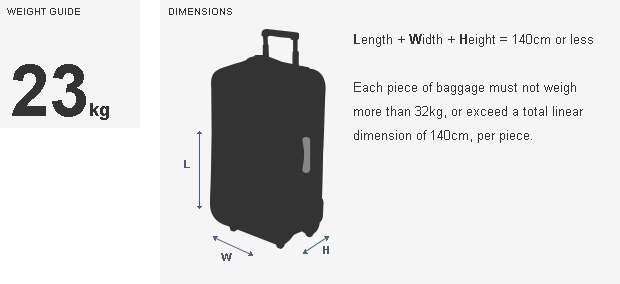
At the time of check-in, passengers have the option to check-in their baggage. For some airlines checked baggage is included in the price, while other airlines may charge a fee. Similar to carry-on baggage, each airline will also have their own restrictions as to the size and weight of each suitcase.
As a general rule suitcases should not exceed a total linear dimension of 140 centimetres (see diagram above) and may weigh between 15 kilograms and 32 kilograms for each piece of luggage in Economy Class. First and Business Class generally allow extra pieces.
Suitcases that weigh over the limit may be subject to an additional fee. Any excess baggage or additional pieces may be organised prior to travel or at the airport check-in desk. Talk to your airline for further details.
Check the weight restrictions to avoid fees (Image: Getty)
Depending on the airline, class of travel and destination, a baggage piece system where passengers can check in up to two or three bags may apply.
The piece system generally applies to flights to and from North, Central and South America. For specific baggage allowances please refer to our domestic or international airline guide.
 Avoid packing any breakables or valuables in your check-in luggage as items may get damaged or lost. Always take your passport, cash, business documents, laptop and medications with you in your carry-on luggage.
Avoid packing any breakables or valuables in your check-in luggage as items may get damaged or lost. Always take your passport, cash, business documents, laptop and medications with you in your carry-on luggage.
Tired of waiting? Get This, Skip The Customs Queue
More tips: Planing Your Flight
Don't forget insurance. Why Travel Insurance Shouldn't Be An Option
Bulky Items

Bulky items such as golf clubs, music equipment, ski equipment or bicycles may be included as part of your checked baggage allowance if there is enough space on the aircraft, or an additional fee may apply.
Generally, items such as fishing rods, bicycles or surfboards must be packed in an appropriate way that abides by the airlines baggage restrictions. For specific details check with your airline.
 When travelling with a bicycle pack it in a travel box, remove the pedals and secure tight as to not damage. Travel boxes are available at most bike shops or directly through the airline.
When travelling with a bicycle pack it in a travel box, remove the pedals and secure tight as to not damage. Travel boxes are available at most bike shops or directly through the airline.
Travelling With An Infant
Infant baggage guidelines vary between airlines and sometimes form part of your adult baggage allowance, depending on the carrier.
Depending on the child's age, infant passengers may also be permitted to bring a car seat or baby capsule on board.
Strollers and collapsible prams are generally allowed to be taken to the boarding gate where they will be checked there. Airlines may also have specific requirements as to the type of car seat in order to ensure the infants safety. For specific infant seat requirements, refer to your airline.
Stollers usually need to be checked (Image: Getty)
Though there are restrictions when it comes to carrying liquids onto an aircraft, parents of infants are allowed to carry a certain amount of breast milk, baby formula, juice or baby food for use during the flight. Amounts will vary depending on the destination and airline. Always check with your airline before departure.
 Try and travel where possible at regular infant sleep hours and pack plenty of nappies and food to cover any unforeseen delays.
Try and travel where possible at regular infant sleep hours and pack plenty of nappies and food to cover any unforeseen delays.
Restricted Items
Items restricted from flying are considered to be dangerous goods that could harm the safety of an aircraft or its passengers. These items are generally determined by the authorities and are governed accordingly.
Some examples of dangerous goods include, but are not limited to, flammable liquids, organic peroxides, lithium batteries and explosives. These items are restricted from both carry-on and check-in luggage.
Carry-on baggage restrictions are also in place for liquids, aerosols and gels on international flights. While these items can be brought into the cabin, they cannot exceed 100 millilitres and must be packed in a resealable clear plastic bag no bigger than one litre.
Some of the restricted items on planes (Image: Getty)
Exemptions apply to medicines and baby products. For more information on international carry-on baggage restrictions, see the Australian Government liquids, aerosols and gel guide.
 If in doubt, always check with your airline before you leave for the airport so your goods are not confiscated.
If in doubt, always check with your airline before you leave for the airport so your goods are not confiscated.
Visit your local Flight Centre store or call 131 600 for more advice and the latest deals.
aviation
